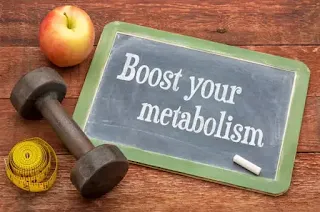Why Am I Eating Less and Exercising, but Not Losing Weight?
– The Truth About Basal Metabolism and Metabolic Rate
“I only eat two meals a day and avoid carbs.”
“I exercise four to five times a week.”
“But my weight doesn’t change—and I feel tired after meals.”
If this sounds familiar, the issue may not be how much you eat or exercise, but rather your metabolism.
Feeling stuck even though you're eating less and exercising more? The answer may be in your metabolism!
🔍 What Is Metabolism?
Metabolism refers to all the biochemical processes your body performs to convert food into energy, maintain cells, and remove waste. It includes two main types:
- Catabolism: breaking down nutrients to generate energy
- Anabolism: using that energy to build and maintain tissues
In short, metabolism is your body’s energy engine—fueling everything from breathing to thinking.
🔥 What Is Basal Metabolic Rate (BMR)?
Your BMR is the amount of energy your body needs to maintain basic life functions at rest, such as breathing, heartbeat, and body temperature.
But here’s the key: everyone’s BMR is different.
- BMR decreases with age
- Women generally have lower BMR than men
- More muscle mass means a higher BMR
So, if you're eating “less” but not losing weight, your total intake might still exceed your body's needs—or your body could be conserving energy due to low metabolic activity.
❓ Why Do We Need to Eat Less as We Age?
You’ve probably heard, “Eat less as you get older.” That advice isn’t just about digestion—it’s also about metabolism.
1️⃣ Reason One: Metabolism naturally slows down with age
As we age, our basal metabolic rate decreases.
Muscle mass declines, and hormones like growth hormone, thyroid hormones, and estrogen drop as well.
This means even the same amount of food can more easily be stored as fat.
For example, someone with a BMR of 1,400 kcal in their 20s may only have 1,150 kcal in their 50s. If they keep eating the same amount, the extra 250 kcal per day is stored as fat.
2️⃣ Reason Two: Digestive strength also declines
Older adults produce less stomach acid and digestive enzymes, and gut motility slows down.
This makes it harder to digest high-fat or high-protein meals efficiently, often causing fatigue or bloating.
✅ What to Do About It:
- Focus on nutrient density over volume (high-nutrient, low-calorie)
- Eat slowly and chew thoroughly
- Prioritize quality protein to preserve muscle mass
- Reduce meal volume if needed, but ensure blood sugar remains stable
In short, mindful eating is not deprivation—it's adapting to how your body changes with age.
Your habits may need an upgrade, not just more discipline. These tips could make the difference.
🔁 What Is Metabolic Rate?
Your metabolic rate refers to the speed and efficiency at which your body burns energy throughout the day. If your metabolism is fast, you convert food into energy easily and tend to feel more alert and energized.
But when your metabolism slows down:
- You feel tired or sleepy after meals
- Your body stores energy as fat more easily
- Even regular exercise may not result in visible weight loss
📉 Could You Have a Low-Metabolism Body Type?
Here are some signs your metabolism might be underactive:
- Cold hands and feet or consistently low body temperature
- No weight loss despite small portion sizes
- Low muscle mass and mostly cardio-based exercise
- Post-meal fatigue
- Long fasting periods (e.g., eating only twice a day)
✅ How to Boost Your Metabolism
- Build muscle to increase BMR – Add strength training 2–3 times a week, especially for legs and core.
- Adjust eating speed and sequence – Eat vegetables first, then protein, and carbs last to reduce blood sugar spikes.
- Break up long fasting windows – Try eating in smaller portions more frequently to stabilize your metabolism.
- Track your body’s signals – Use body composition scans, glucose monitors, or track your body temperature.
Want to fire up your metabolism again? These strategies can help your body burn more with less effort.
🔗 Recommended Resources
👉 Coming Up Next
In Part 2, we’ll explore:
📍 “Why does my belly stay the same even with long fasting?”
📍 “Is post-meal fatigue a warning sign from your blood sugar?”
→ Read Part 2: I Fast for Long Hours – So Why Am I Still Not Losing Weight?

